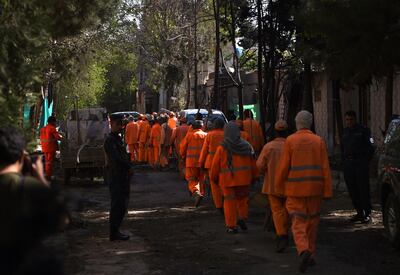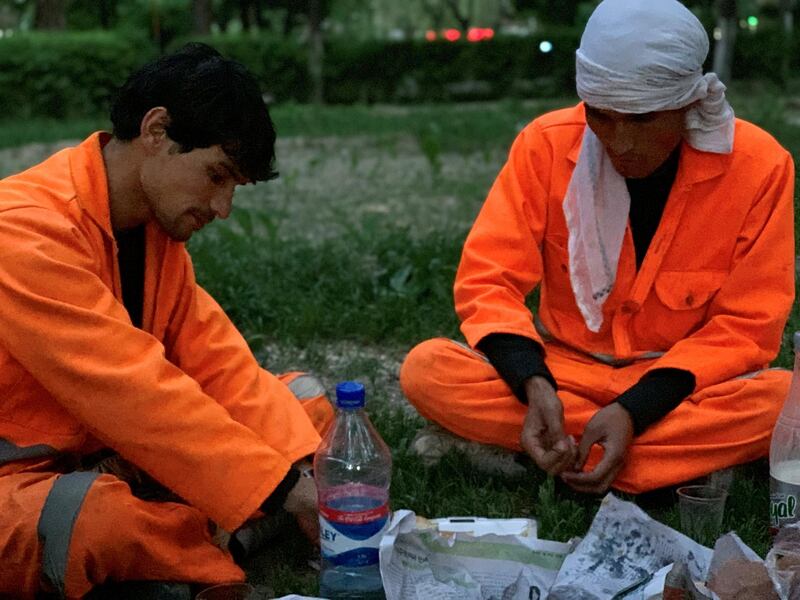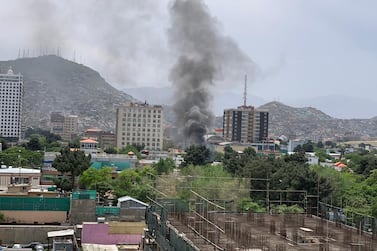The sun was setting over the Afghan capital on the second day of Ramadan, the Muslim month of fasting, prayer and good deeds, but municipality cleaners Zabihullah and Fahim were still out on the streets of Kabul, hours after their shifts had ended.
“The money we make isn’t enough to survive, which is why after work we walk around, so that people will give us something – money, food, bread,” said Zabihullah, 24, who has worked as a city cleaner since he was 15 years old.
They earn about 11,000 Afghanis (Dh518) a month and both men are the sole breadwinners in large families that include disabled parents and siblings in need medical care.
As the time approached for iftar, the breaking of the day-long fast, we asked to join in their meal. They guided us to a spot in Sharenaw Park, a small green space in the city centre, where we sat around portions kebabs and Qabili pulao, an Afghan dish of rice and meat cooked with carrots and raisins, and a bottle of dogh, a buttermilk drink.
After a short prayer for themselves, their families and for peace in their country, we broke bread together. Over the course of the simple meal, Zabihullah and Fahim shared their hopes and their views on the future of Afghanistan.
“I had a lot of big dreams in high school; I wanted to achieve a lot. I enrolled for a lot of private courses along with my schooling – computers, English, mathematics – so I could earn a better living,” said Fahim, 25, who has worked for the municipality for five years.
However, nearly two decades of insurgency by the Taliban has taken its toll on the Afghan economy. Forty-two per cent of the working-age population is unemployed, according to the International Labour Organisation. The hardline Islamists, whose regime was toppled by the US-led invasion in 2001, now exert control over almost half of the country and have stepped up their attacks on security forces and government targets.
According to the World Bank, the continued insecurity is curtailing private investment and consumer demand, while agricultural growth has been affected by severe drought in the recent years.
In these circumstances, Fahim and Zabihullah are grateful for their jobs. “The good thing is that it is a steady income and I don’t have to wait for work like the daily wage labourers,” said Zabihullah, as Fahim nodded in agreement.
But in a city that witnesses as much violence as Kabul, being a street cleaner comes with additional challenges. Several times in recent years, Zabihullah and Fahim have been called in to clean up after insurgent attacks – scenes of blood, death and destruction that leave long-term emotional scars.
“About a year ago, I was called to clean up after the ambulance bomb outside the Jhumuriyat Hospital. We were cleaning till 1.30am that night,” said Zabihullah, recalling a Taliban attack in January 2018 that claimed the lives of more than 100 people and injured 235.
“What we saw that night could even break the heart of an infidel, there was so much blood and destruction. I was so disturbed I couldn’t even concentrate on the work I was doing,” he said.
“Whenever I have to go to such places to clean up, I can’t function for the next few days," said Fahim. "My heart feels heavy all the time, I can’t eat anything for days.”

Times like these also remind them of the risk they face working on the streets of Kabul.
“When we leave in the mornings, we don’t know if we will return home. We live in fear, but where is peace?” said Zabihullah.
Neither of them hold out much hope for various recent peace attempts involving the Taliban, the US, Russia and senior Afghan politicians outside the government, with whom the insurgents refuse to have direct contact.
“We have no peace because our elders who are negotiating this are all sold to the foreign interest," said Zabihullah. "We won’t have real peace till the younger generation is involved in the talks."
They have doubts about the Taliban's intentions as well. “I don’t think they will make peace," said Fahim. "The situation just keeps getting worse, and we are cleaning up after more attacks."
Zabihullah recalled fondly the first and only ceasefire ever observed by the Taliban, during the Eid Al Fitr festival at the end of Ramadan last year. “The three days of ceasefire were such a wonderful time. We saw the Taliban on our streets taking selfies with the people.”
Both men were critical of the recent loya jirga, or grand assembly, organised by President Ashraf Ghani in Kabul to reach a national consensus on making peace with the Taliban. More than 3,500 political leaders, tribal elders, activists and influential members of Afghan society took part and the capital was shut down for a week to ensure security for the massive gathering.
“They didn’t once think about the poor who were affected by the shutdown," said Zabihullah. "Businessmen couldn’t sell their wares, had to close shops. Workers like us had to take longer routes to get to work because of the road closures. If we didn’t go to work, they would have cut our already meagre salaries."
Despite the security threats, low pay and occasionally being shunned by fellow citizens, both men find satisfaction in their jobs, which they see as a service to the nation. “This country is like our mother, helping to keep it clean and orderly is service to the mother,” said Fahim.
Zabihullah and Fahim pause the conversation to pray, using the scarves they carry as prayer mats on the damp green grass of the park. They say they find solace from their sufferings in prayer, and the spirituality of Ramadan fills them with hope for a better future.
“Ramadan is a month of forgiveness, we ask for forgiveness, not only for ourselves, but for all. We pray that the next Ramadan we observe is in a time of peace,” said Fahim.
“If the Taliban make peace with us, we will have more happiness, more opportunities, a better economy. But for now the only future plan I have is to earn enough money to survive,” he said while meticulously cleaning up, almost out of habit, the spot where we shared a meal.






